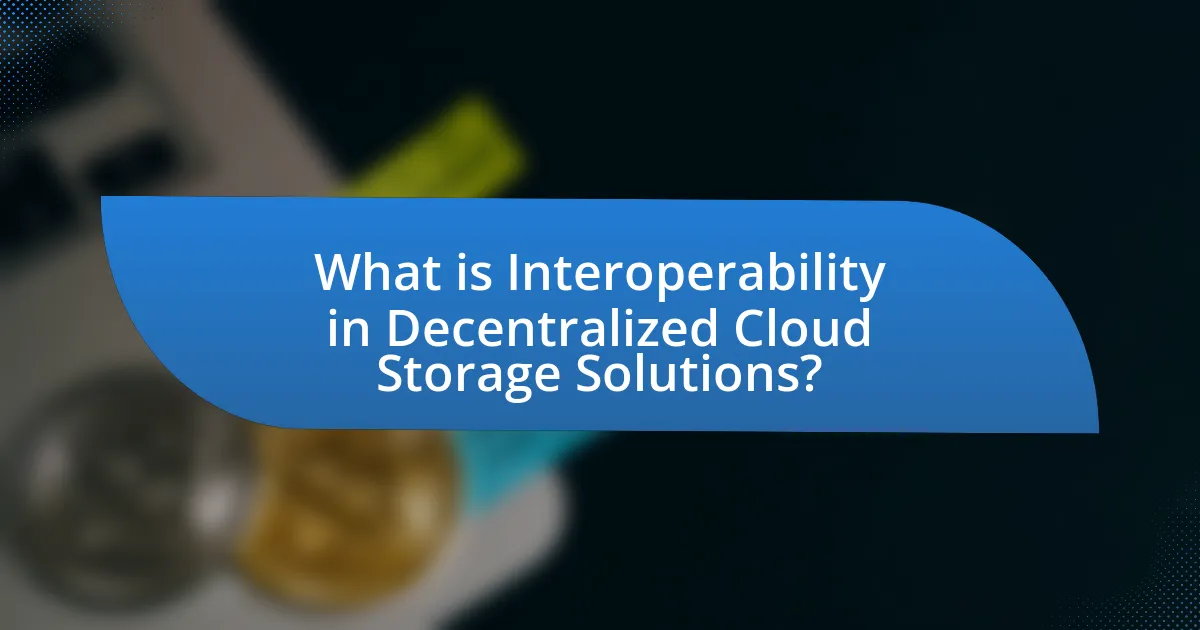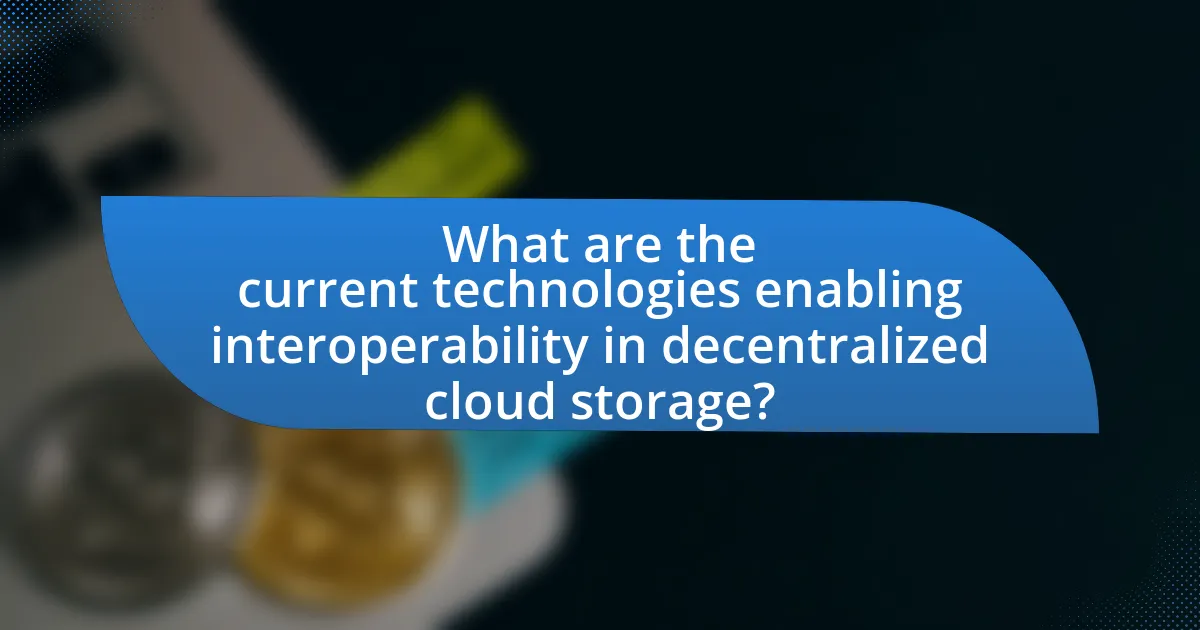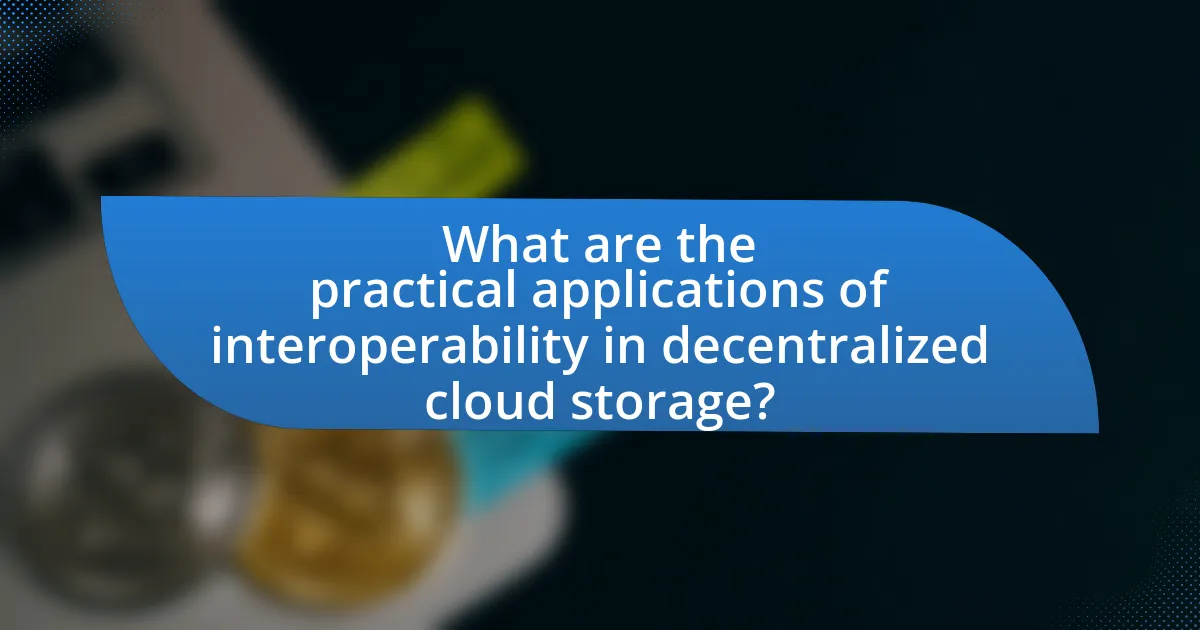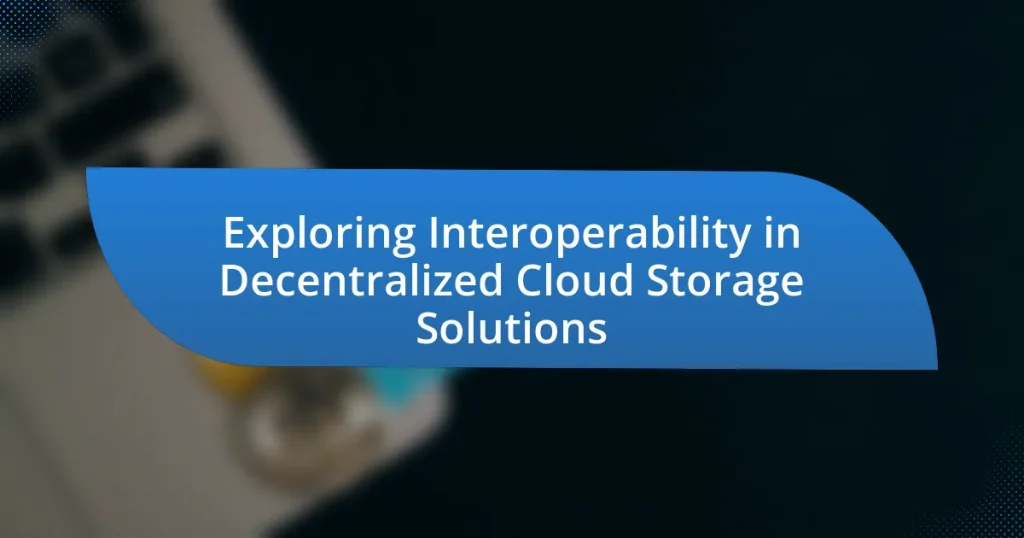Interoperability in decentralized cloud storage solutions refers to the seamless ability of various storage systems and platforms to work together, allowing users to access and manage their data across different services without compatibility issues. This article explores how interoperability enhances user experience by enabling data portability, flexibility, and improved security through standardized protocols like IPFS and blockchain technologies. It also discusses the challenges posed by a lack of interoperability, the impact on user experience, and the current technologies facilitating these solutions. Additionally, the article highlights practical applications, industry benefits, best practices for implementation, and future trends shaping interoperability in decentralized cloud storage.

What is Interoperability in Decentralized Cloud Storage Solutions?
Interoperability in decentralized cloud storage solutions refers to the ability of different storage systems and platforms to work together seamlessly, allowing users to access and manage their data across various services without compatibility issues. This capability is essential for enhancing user experience, as it enables data portability and flexibility, allowing users to switch providers or integrate multiple services without losing access to their data. For instance, protocols like IPFS (InterPlanetary File System) and blockchain technologies facilitate interoperability by standardizing data formats and access methods, ensuring that diverse systems can communicate effectively.
How does interoperability enhance decentralized cloud storage?
Interoperability enhances decentralized cloud storage by enabling seamless data exchange and integration across different platforms and services. This capability allows users to access, share, and manage their data without being locked into a single provider, thereby increasing flexibility and user control. For instance, interoperability facilitates the use of various decentralized protocols, which can lead to improved data redundancy and security, as users can distribute their data across multiple nodes and services. Additionally, studies have shown that interoperable systems can reduce costs and improve efficiency by allowing users to choose the best services for their specific needs, ultimately fostering a more competitive and innovative ecosystem in decentralized cloud storage.
What are the key features of interoperability in this context?
The key features of interoperability in decentralized cloud storage solutions include seamless data exchange, standardized protocols, and cross-platform compatibility. Seamless data exchange allows different storage systems to communicate effectively, ensuring that users can access and share data across various platforms without barriers. Standardized protocols, such as those defined by the InterPlanetary File System (IPFS) or the Filecoin network, facilitate this communication by providing a common framework for data management. Cross-platform compatibility ensures that users can interact with multiple decentralized storage services, enhancing flexibility and user experience. These features collectively enable a cohesive ecosystem where data can be stored, retrieved, and managed efficiently across diverse decentralized platforms.
How does interoperability differ from traditional cloud storage solutions?
Interoperability allows different cloud storage systems to communicate and share data seamlessly, while traditional cloud storage solutions typically operate in isolated environments with limited compatibility. This difference means that interoperability enhances flexibility and user choice, enabling users to move data across platforms without vendor lock-in, which is a common limitation in traditional systems. For instance, interoperability standards like Open Cloud Computing Interface (OCCI) facilitate integration across various cloud services, contrasting with traditional solutions that often require proprietary APIs, restricting data access and transfer.
Why is interoperability important for decentralized cloud storage?
Interoperability is crucial for decentralized cloud storage because it enables different storage systems to communicate and work together seamlessly. This capability allows users to transfer data across various platforms without being locked into a single provider, enhancing flexibility and user control. Furthermore, interoperability fosters innovation by allowing developers to create applications that can leverage multiple storage solutions, thereby improving functionality and user experience. Studies indicate that systems with high interoperability can achieve up to 30% greater efficiency in data management, demonstrating its significant impact on performance and usability in decentralized environments.
What challenges does lack of interoperability present?
Lack of interoperability presents significant challenges in decentralized cloud storage solutions, primarily hindering data exchange and collaboration across different platforms. This limitation results in fragmented data silos, where users cannot seamlessly access or share information stored in disparate systems. Consequently, organizations face increased operational costs due to the need for multiple tools and processes to manage data across incompatible systems. Furthermore, the absence of standardized protocols can lead to security vulnerabilities, as inconsistent data handling practices may expose sensitive information to risks. These challenges underscore the necessity for developing interoperable frameworks to enhance efficiency and security in decentralized cloud environments.
How does interoperability impact user experience and data accessibility?
Interoperability significantly enhances user experience and data accessibility by enabling seamless integration and communication between different systems and platforms. When systems are interoperable, users can easily access and share data across various applications without encountering compatibility issues. This ease of access leads to improved efficiency, as users spend less time navigating between disparate systems. For instance, a study by the International Organization for Standardization (ISO) highlights that organizations with interoperable systems report a 30% increase in productivity due to reduced data silos and streamlined workflows. Thus, interoperability not only simplifies user interactions but also ensures that data is readily available, fostering a more cohesive and efficient digital environment.

What are the current technologies enabling interoperability in decentralized cloud storage?
Current technologies enabling interoperability in decentralized cloud storage include blockchain protocols, decentralized identifiers (DIDs), and interoperability frameworks like IPFS (InterPlanetary File System) and Filecoin. Blockchain protocols facilitate secure data sharing and verification across different platforms, while DIDs provide a standardized way to manage identities and access control in a decentralized manner. IPFS and Filecoin enhance data storage and retrieval efficiency, allowing seamless interaction between various decentralized applications. These technologies collectively ensure that data can be accessed and managed across different decentralized storage solutions, promoting a cohesive ecosystem.
How do blockchain technologies facilitate interoperability?
Blockchain technologies facilitate interoperability by enabling different blockchain networks to communicate and share data seamlessly. This is achieved through standardized protocols and cross-chain communication mechanisms, such as atomic swaps and interoperability frameworks like Polkadot and Cosmos. These frameworks allow diverse blockchains to exchange information and assets without the need for intermediaries, enhancing collaboration and efficiency across decentralized applications. For instance, Polkadot utilizes a relay chain to connect multiple blockchains, allowing them to operate together while maintaining their unique features. This interoperability is crucial for decentralized cloud storage solutions, as it allows users to access and manage data across various platforms without being locked into a single ecosystem.
What role do smart contracts play in this process?
Smart contracts automate and enforce agreements in decentralized cloud storage solutions, ensuring trust and transparency among participants. They facilitate the execution of predefined conditions without intermediaries, which enhances efficiency and reduces the risk of fraud. For instance, when a user uploads data, a smart contract can automatically verify the storage conditions and release payment to the storage provider only upon successful verification, thus streamlining transactions and maintaining data integrity.
How do decentralized identifiers contribute to interoperability?
Decentralized identifiers (DIDs) enhance interoperability by providing a standardized method for identifying entities across different systems without relying on a central authority. This standardization allows various decentralized applications and services to recognize and interact with each other seamlessly, facilitating data exchange and collaboration. For instance, the W3C’s DID specification outlines how DIDs can be used across multiple platforms, ensuring that identity verification and data sharing occur consistently, regardless of the underlying technology. This capability is crucial in decentralized cloud storage solutions, where diverse systems must work together to provide a cohesive user experience.
What protocols are commonly used for interoperability?
Commonly used protocols for interoperability include HTTP, REST, SOAP, and WebSocket. These protocols facilitate communication and data exchange between different systems and applications. For instance, HTTP is the foundation of data communication on the web, while REST and SOAP are architectural styles for designing networked applications, enabling seamless interaction between diverse services. WebSocket provides full-duplex communication channels over a single TCP connection, enhancing real-time data exchange. The widespread adoption of these protocols is evidenced by their integration in numerous APIs and services, ensuring compatibility across various platforms and technologies.
What are the advantages of using specific interoperability protocols?
The advantages of using specific interoperability protocols include enhanced communication between diverse systems, improved data exchange efficiency, and increased compatibility across platforms. These protocols facilitate seamless integration, allowing different decentralized cloud storage solutions to work together effectively. For instance, the use of protocols like IPFS (InterPlanetary File System) enables efficient file sharing and retrieval across various nodes, significantly reducing latency and improving user experience. Additionally, interoperability protocols often adhere to standardized frameworks, which promote scalability and future-proofing, ensuring that systems can evolve without losing compatibility.
How do these protocols ensure data integrity and security?
Protocols ensure data integrity and security through mechanisms such as cryptographic hashing, digital signatures, and encryption. Cryptographic hashing generates a unique fixed-size output for data, allowing verification of data integrity by comparing hashes before and after transmission. Digital signatures authenticate the origin of the data, ensuring that it has not been altered in transit. Encryption protects data confidentiality by transforming it into an unreadable format for unauthorized users. These methods collectively safeguard against unauthorized access and data tampering, thereby maintaining the integrity and security of information in decentralized cloud storage solutions.

What are the practical applications of interoperability in decentralized cloud storage?
Interoperability in decentralized cloud storage enables seamless data exchange and collaboration across different platforms and services. This practical application allows users to access, share, and manage their data without being locked into a single provider, enhancing flexibility and user control. For instance, interoperability facilitates the integration of various decentralized applications (dApps), enabling users to utilize multiple services such as file storage, data processing, and analytics without compatibility issues. Additionally, it supports cross-platform data migration, allowing users to transfer their data between different decentralized storage solutions effortlessly. This capability is crucial for maintaining data sovereignty and ensuring that users can choose the best services for their needs without losing access to their data.
How can businesses leverage interoperability for competitive advantage?
Businesses can leverage interoperability for competitive advantage by enabling seamless integration of diverse systems and platforms, which enhances operational efficiency and customer experience. By adopting interoperable solutions, companies can streamline workflows, reduce data silos, and facilitate better collaboration across departments and with external partners. For instance, a study by the International Data Corporation (IDC) found that organizations with high interoperability capabilities can achieve up to 30% faster time-to-market for new products. This agility allows businesses to respond quickly to market changes and customer demands, ultimately leading to increased market share and profitability.
What industries are most likely to benefit from these solutions?
The industries most likely to benefit from decentralized cloud storage solutions include healthcare, finance, and supply chain management. Healthcare can leverage these solutions for secure patient data sharing and compliance with regulations like HIPAA. The finance sector benefits from enhanced security and transparency in transactions, reducing fraud risks. Supply chain management can utilize decentralized storage for real-time tracking and verification of goods, improving efficiency and trust among stakeholders. These industries require robust data security, interoperability, and efficient data management, which decentralized cloud storage solutions provide effectively.
How does interoperability support data sharing across platforms?
Interoperability facilitates data sharing across platforms by enabling different systems to communicate and exchange information seamlessly. This capability allows users to access and utilize data from various sources without being restricted by proprietary formats or protocols. For instance, in decentralized cloud storage solutions, interoperability ensures that data stored on one platform can be retrieved and used by applications on another platform, enhancing collaboration and efficiency. Studies indicate that interoperability can significantly reduce data silos, leading to improved data accessibility and utilization across diverse systems.
What are the best practices for implementing interoperability in decentralized cloud storage?
The best practices for implementing interoperability in decentralized cloud storage include adopting standardized protocols, ensuring data portability, and utilizing open-source solutions. Standardized protocols, such as InterPlanetary File System (IPFS) and Filecoin, facilitate seamless communication between different storage systems, enhancing compatibility. Data portability allows users to transfer their data across various platforms without loss, which is crucial for maintaining user control and flexibility. Open-source solutions promote transparency and community collaboration, enabling continuous improvement and innovation in interoperability features. These practices collectively enhance user experience and foster a more integrated decentralized storage ecosystem.
What common pitfalls should organizations avoid?
Organizations should avoid the common pitfall of neglecting interoperability standards when implementing decentralized cloud storage solutions. Failing to adhere to established interoperability protocols can lead to data silos, where information becomes trapped within specific platforms, limiting accessibility and collaboration. According to a study by the International Organization for Standardization, organizations that prioritize interoperability experience a 30% increase in operational efficiency, demonstrating the importance of integrating compatible systems to facilitate seamless data exchange.
How can organizations ensure compliance with data regulations while maintaining interoperability?
Organizations can ensure compliance with data regulations while maintaining interoperability by implementing robust data governance frameworks that align with regulatory requirements and support standardized data formats. These frameworks facilitate the integration of compliance measures, such as data encryption and access controls, while allowing seamless data exchange across different systems. For instance, the General Data Protection Regulation (GDPR) mandates specific data handling practices, and organizations can utilize Application Programming Interfaces (APIs) that adhere to these standards to ensure both compliance and interoperability. By adopting industry standards like ISO/IEC 27001 for information security management, organizations can demonstrate their commitment to regulatory compliance while enabling interoperability across diverse platforms.
What future trends can we expect in interoperability for decentralized cloud storage?
Future trends in interoperability for decentralized cloud storage include the development of standardized protocols, enhanced cross-platform compatibility, and the integration of blockchain technology for secure data sharing. Standardized protocols, such as the InterPlanetary File System (IPFS) and Filecoin, are being adopted to facilitate seamless data exchange across different decentralized platforms. Enhanced cross-platform compatibility will enable users to access and manage their data across various decentralized storage solutions without vendor lock-in. Additionally, the integration of blockchain technology will provide a secure and transparent framework for data transactions, ensuring data integrity and user control. These trends are supported by the increasing demand for decentralized solutions that prioritize user privacy and data sovereignty, as evidenced by the growing adoption of decentralized applications (dApps) and the rise of Web3 technologies.
How might emerging technologies influence interoperability solutions?
Emerging technologies significantly influence interoperability solutions by enabling seamless communication and data exchange across diverse systems. For instance, advancements in blockchain technology facilitate secure and transparent transactions between different platforms, enhancing trust and reducing the need for intermediaries. Additionally, the integration of artificial intelligence allows for intelligent data mapping and transformation, which streamlines the process of aligning disparate data formats and protocols. Furthermore, the adoption of APIs (Application Programming Interfaces) and microservices architecture promotes modularity, allowing systems to interact more flexibly and efficiently. These technologies collectively enhance interoperability by providing robust frameworks that support real-time data sharing and collaboration across decentralized cloud storage solutions.
What role will user demand play in shaping future developments?
User demand will significantly influence future developments in decentralized cloud storage solutions by driving innovation and prioritizing features that enhance user experience. As users increasingly seek interoperability, their preferences will shape the design and functionality of these systems, leading to the integration of diverse platforms and services. For instance, a survey by Gartner in 2022 indicated that 70% of organizations prioritize interoperability in their cloud strategies, highlighting the importance of user demand in guiding technological advancements. This trend will compel developers to create solutions that not only meet current user needs but also anticipate future requirements, ensuring that decentralized cloud storage remains competitive and relevant.


